
International Journal of Heat and Technology
Scope & Guideline
Connecting Academia and Industry through Heat Research
Introduction
Aims and Scopes
- Heat Transfer Mechanisms:
Research in this area focuses on understanding the principles and mechanisms of heat transfer across different mediums, including conduction, convection, and radiation. Studies often involve both theoretical modeling and experimental validations. - Thermal Energy Management:
This scope includes investigations into energy efficiency, energy conservation techniques, and optimization of thermal systems across various applications, such as HVAC systems, industrial processes, and renewable energy systems. - Nanotechnology in Heat Applications:
The journal publishes research on the use of nanomaterials and nanofluids to enhance thermal properties and performance in various applications, including cooling systems, heat exchangers, and thermal storage. - Renewable Energy Systems:
Papers in this category examine the integration of heat technology with renewable energy sources, focusing on solar thermal applications, biomass energy, and geothermal systems, emphasizing sustainability and ecological impacts. - Thermal Analysis of Materials:
This includes studies on the thermal properties of materials, thermal fatigue, and the implications of thermal stresses in construction, manufacturing, and material science. - Computational Fluid Dynamics (CFD) Applications:
The journal features advanced computational techniques for simulating and analyzing thermal and fluid dynamics, often applied in optimizing heat exchanger designs and thermal systems. - Innovative Thermal Technologies:
This area covers the development and assessment of new technologies for heat generation, transfer, and storage, including hybrid systems and novel cooling mechanisms.
Trending and Emerging
- Sustainable and Green Technologies:
There is an increasing focus on sustainable technologies, including the use of renewable energy sources and environmentally friendly materials, reflecting a global push for sustainability in engineering practices. - Smart Thermal Systems:
Research on smart thermal management systems utilizing IoT and AI for real-time monitoring and control is gaining traction, highlighting the integration of technology for enhanced efficiency. - Advanced Materials for Heat Applications:
The use of advanced materials, including phase change materials and nanomaterials, to enhance thermal performance and efficiency is becoming a significant area of research, indicating a trend toward innovation in material science. - Thermal Integration in Multi-Energy Systems:
Papers exploring the integration of thermal technologies within multi-energy systems, such as hybrid heating and cooling systems, are emerging, reflecting the need for comprehensive energy solutions. - Thermal Performance in Urban Environments:
Research addressing the thermal performance of buildings and urban infrastructure, particularly in the context of urban heat islands and climate change, is becoming increasingly important. - Computational and Experimental Synergy:
A trend towards integrating computational methods with experimental approaches to validate findings and enhance the reliability of thermal analyses is evident in recent publications.
Declining or Waning
- Traditional Heat Exchanger Designs:
Research focused on conventional heat exchanger designs has seen a decline as the field shifts towards innovative designs and materials, such as using nanofluids and new geometries for enhanced performance. - Basic Thermal Conductivity Studies:
While foundational studies on thermal conductivity remain important, the focus has shifted toward more applied research that integrates thermal conductivity with real-world applications, reducing the publication of purely theoretical studies. - Single-Fuel Energy Systems:
Research concentrating on single-fuel systems, such as traditional fossil fuels, is waning as there is a greater emphasis on hybrid and renewable energy solutions, reflecting a broader trend toward sustainability. - Static Thermal Analysis:
The journal has seen a decrease in papers focusing solely on static thermal analysis without consideration of dynamic factors or real-world applications, as there is a growing interest in dynamic thermal management and real-time analysis. - Localized Industrial Applications:
Research specifically targeting localized or niche industrial applications has become less frequent, as more comprehensive studies that address broader applications and implications are favored.
Similar Journals
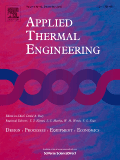
APPLIED THERMAL ENGINEERING
Pioneering research at the intersection of energy and engineering.Applied Thermal Engineering is a leading international journal dedicated to the field of thermal engineering, published by Pergamon-Elsevier Science Ltd. With an impressive impact factor indicating its significance in the academic community, this journal focuses on innovative research and developments related to energy engineering, fluid flow, and transfer processes, as well as manufacturing and mechanical engineering. Being indexed in top quartiles (Q1) across multiple categories, it ranks exceptionally well on platforms like Scopus, ensuring that contributors reach a wide and relevant audience. The journal supports both open access and subscription options, promoting the dissemination of vital research findings from 1996 to 2024. With its commitment to advancing the discipline and implementing rigorous peer-review processes, Applied Thermal Engineering serves as an essential resource for researchers, industry professionals, and students aiming to stay abreast of the latest advancements and applied methodologies in thermal science.
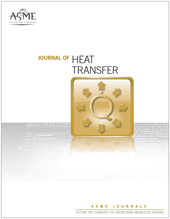
JOURNAL OF HEAT TRANSFER-TRANSACTIONS OF THE ASME
Fostering Innovation in Heat Transfer Technologies.JOURNAL OF HEAT TRANSFER-TRANSACTIONS OF THE ASME, with ISSN 0022-1481 and E-ISSN 1528-8943, is a leading publication in the field of heat transfer, mechanical engineering, and related disciplines, published by the renowned American Society of Mechanical Engineers (ASME). This esteemed journal, which has been in circulation since 1945, provides a platform for novel research findings and reviews that the mechanical engineering community can rely upon, contributing significantly to the advancement of knowledge in heat transfer processes. The journal is recognized for maintaining a strong impact in several categories, attaining Q2 quartile rankings in Condensed Matter Physics, Mechanical Engineering, and Mechanics of Materials, reflecting its influential role in shaping scientific dialogues. With a commendable Scopus ranking, including a percentile of 63rd in Mechanical Engineering, it attracts submissions from leading researchers and industry professionals alike. Although access options are currently undergoing changes, the commitment to disseminating cutting-edge research remains steadfast. Gathering insights from historical and contemporary studies, the JOURNAL OF HEAT TRANSFER stands as a vital resource for those aiming to innovate in heat transfer technologies and methodologies.
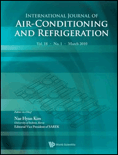
International Journal of Air-Conditioning and Refrigeration
Exploring the Frontiers of Air-Conditioning and RefrigerationInternational Journal of Air-Conditioning and Refrigeration is a leading peer-reviewed journal published by SpringerNature, focusing on pioneering research in the fields of air-conditioning and refrigeration technologies. With an Open Access model adopted since 2022, the journal ensures that high-quality research is freely accessible to a broad audience, facilitating knowledge dissemination and innovation. The journal covers a diverse range of topics, including control systems, fluid flow, and renewable energy applications, making it relevant for professionals and researchers within the disciplines of Control and Systems Engineering, Fluid Flow and Transfer Processes, and Renewable Energy. Positioned in the Q3 quartile across multiple categories as of 2023, it offers a valuable platform for emerging trends and sustainable practices in the industry. The Scopus rankings reflect its commitment to scholarly excellence, highlighting its role as an essential resource for those engaged in the development and implementation of innovative air-conditioning and refrigeration systems.

Journal of Thermal Science
Exploring the depths of thermal science for a sustainable future.Journal of Thermal Science is a prestigious academic publication dedicated to the field of thermal science and its applications. Published by SPRINGER, this journal has been at the forefront of knowledge dissemination since its inception in 1992 and continues to provide a platform for researchers and professionals to share their innovative findings through high-quality peer-reviewed articles. With its ISSN 1003-2169 and E-ISSN 1993-033X, the journal covers a diverse array of topics related to thermal processes, materials, and engineering, significantly contributing to advancements in Condensed Matter Physics. In the latest rankings, it holds a commendable Q2 category in the 2023 quartiles, further highlighting its relevance with a Scopus ranking of #183/434 in its field, placing it in the top 57th percentile. While currently not offering open access, the journal strives to bridge the gap between theory and practice, making substantial impacts on both academia and industry. Its continued exploration of cutting-edge research ensures that it remains a key resource for students and professionals looking to expand their knowledge and foster innovation in thermal sciences.

JOURNAL OF ENGINEERING PHYSICS AND THERMOPHYSICS
Illuminating the Path of Engineering Physics ResearchJOURNAL OF ENGINEERING PHYSICS AND THERMOPHYSICS, published by Springer, is a vital resource for researchers and professionals in the fields of engineering physics and thermophysics. With an ISSN of 1062-0125 and an E-ISSN of 1573-871X, this esteemed journal has been disseminating high-quality research since its inception, covering critical advancements in both condensed matter physics and various engineering disciplines. Despite its classification within the third quartile in both Scopus categories for 2023, the journal remains a significant conduit for innovative studies that push the boundaries of knowledge in thermal and physical engineering, with converged years spanning from 1992 to 1997 and 2004 to 2024. The journal does not offer open access, which means subscribers and institutions have exclusive access to its rich content. As the field continues to evolve, JOURNAL OF ENGINEERING PHYSICS AND THERMOPHYSICS plays an essential role in fostering scholarly discussions and supporting the academic community in tackling contemporary engineering challenges.

Journal of Nanofluids
Pioneering Advances in Nanofluid TechnologyJournal of Nanofluids, published by AMER SCIENTIFIC PUBLISHERS, is a leading international journal dedicated to the burgeoning field of nanofluid technology which bridges the areas of fluid dynamics and nanotechnology. With an ISSN of 2169-432X and E-ISSN of 2169-4338, this journal has established itself as a valuable resource for researchers and professionals in Mechanical Engineering and Chemical Engineering, particularly in the domains of fluid flow and transfer processes. Its prestigious standing is reflected in the 2023 Scopus rankings, positioning it in the 79th percentile for Mechanical Engineering and the 78th percentile for Fluid Flow and Transfer Processes. Although coverage has been discontinued in Scopus since 2021, the journal maintains a Q2 category ranking in both relevant fields, emphasizing its commitment to high-quality and impactful research dissemination. This journal aims to foster innovation and collaboration among scientists and engineers worldwide, providing a platform for groundbreaking research, reviews, and discussions on nanofluids, their properties, and applications. As an essential addition to the library of any researcher or student vested in advanced fluid dynamics, the Journal of Nanofluids serves as a pivotal conduit for advancing knowledge and technology in this exciting and evolving field.
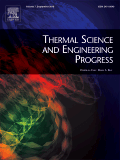
Thermal Science and Engineering Progress
Exploring the forefront of heat transfer technologies.Thermal Science and Engineering Progress is a premier peer-reviewed journal published by ELSEVIER, established to bridge the gap between theoretical and practical advancements within the fields of thermal science and engineering. Since its inception in 2017, this esteemed journal has rapidly ascended to a Q1 ranking in the category of Fluid Flow and Transfer Processes, positioning it among the top 17 of 96 journals in this discipline, as reflected by its impressive 82nd percentile ranking in Scopus. With a focus on disseminating high-impact research, Thermal Science and Engineering Progress aims to foster innovation and collaboration by publishing cutting-edge studies that address both contemporary challenges and future directions in thermal management, energy conversion, and heat transfer technologies. Researchers, professionals, and students alike are invited to explore the wealth of knowledge contained within its pages, which are accessible from its headquarters in Amsterdam, Netherlands. This journal plays a critical role in advancing technological progress and fostering a deeper understanding of thermal processes, making it an essential resource for anyone dedicated to these crucial areas of study.
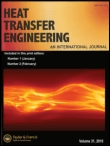
HEAT TRANSFER ENGINEERING
Pioneering research in thermal dynamics and engineering solutions.HEAT TRANSFER ENGINEERING is a leading international journal published by Taylor & Francis Inc, dedicated to advancing the field of heat transfer and thermal engineering. With a strong focus on the key aspects of Condensed Matter Physics, Fluid Flow and Transfer Processes, and Mechanical Engineering, this journal covers a comprehensive range of topics from experimental studies to theoretical analysis, aiming to foster innovative research and practical applications. Since its inception in 1979 and continuing through 2024, the journal has established itself as an essential resource for researchers and industry professionals alike, reflected in its solid rankings within Scopus—holding a Q2 quartile classification in multiple engineering disciplines. Although not open access, the journal ensures broad accessibility through institutional subscriptions, making cutting-edge research readily available. With its rigorous peer-review process and commitment to quality, HEAT TRANSFER ENGINEERING plays a crucial role in shaping the future of thermal management solutions and engineering practices.

EXPERIMENTAL HEAT TRANSFER
Pioneering Research in Thermal EngineeringEXPERIMENTAL HEAT TRANSFER, published by Taylor & Francis Inc, is a leading journal in the fields of heat transfer, control and systems engineering, and instrumentation, with a strong impact factor evidenced by its placement in the second quartile (Q2) for relevant categories as of 2023. With ISSN 0891-6152 and E-ISSN 1521-0480, the journal has been an essential platform for researchers since its inception in 1987, facilitating the dissemination of innovative research, experimental methods, and advancements in thermal engineering. This journal, based in the United Kingdom, focuses on both applied and theoretical aspects of heat transfer, engaging a diverse audience of professionals and students keen on the latest scientific breakthroughs in the domain. With its solid Scopus rankings, including being in the top 76th percentile in Physics and Astronomy: Instrumentation, EXPERIMENTAL HEAT TRANSFER continues to be a vital resource for advancing knowledge and fostering collaboration among the academic community.

Computational Thermal Sciences
Pioneering Research in Energy Engineering and Fluid DynamicsComputational Thermal Sciences, an esteemed journal published by BEGELL HOUSE INC, presents cutting-edge research at the intersection of computational mathematics, energy engineering, and fluid dynamics. With an ISSN of 1940-2503 and an E-ISSN of 1940-2554, this journal aims to disseminate high-quality research articles, reviews, and methodologies that improve our understanding of thermal processes and their applications. Renowned for its solid impact in the field, it holds a Q3 ranking in multiple categories including Computational Mathematics and Energy Engineering for 2023. As the field evolves, the journal continues to play a pivotal role in bridging theoretical research with practical innovations, thereby catering to a diverse audience of researchers, professionals, and students. Although it operates on a subscription model, the journal ensures accessibility to significant contributions in thermal sciences from 2009 to 2024, fostering an environment of knowledge sharing and collaboration.